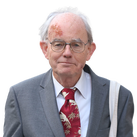PROPOSITIONS : Revealing the silent minority
Masons should have to declare membership, says Chris Mullin

Your support helps us to tell the story
From reproductive rights to climate change to Big Tech, The Independent is on the ground when the story is developing. Whether it's investigating the financials of Elon Musk's pro-Trump PAC or producing our latest documentary, 'The A Word', which shines a light on the American women fighting for reproductive rights, we know how important it is to parse out the facts from the messaging.
At such a critical moment in US history, we need reporters on the ground. Your donation allows us to keep sending journalists to speak to both sides of the story.
The Independent is trusted by Americans across the entire political spectrum. And unlike many other quality news outlets, we choose not to lock Americans out of our reporting and analysis with paywalls. We believe quality journalism should be available to everyone, paid for by those who can afford it.
Your support makes all the difference.If Lord Nolan is serious in his desire to clean up public life - and I am sure he is - there is one shadowy area that sooner or later he will have to address. I refer, of course, to freemasonry.
My proposition is a simple one. We cannot expect the public to have confidence in public institutions when many public servants are known to be members of a secret society, one of the aims of which is mutual self-advancement.
It is no part of my case that all masons are corrupt. On the contrary, I am confident that most masons are honest citizens who would not dream of abusing their position in pursuit of personal gain. I am equally confident that others would. Those who seek evidence need look no further than Inside The Brotherhood, Martin Short's excellent book on the subject.
In Sunderland, part of which I represent in Parliament, there are about 1,700 masons in 29 lodges, embracing a fair swathe of the male professional middle class in the City.
I have the local masonic handbook and among the office-holders whose names are listed I see policemen, magistrates, consultants. I see a former chief executive of the borough council, a former (Tory) leader of the council, a former director of housing.
I see a former deputy director of engineering, who was obliged to resign several years ago after allegations of conflict between his professional duties and outside business interests. His name is preceded by the letters IG which, I understand from those who know about these matters, stands for Inner Guard.
There is no reason to suppose that Sunderland is in any way untypical. There are about half a million masons throughout Britain and they are to be found at every level in every profession.
They are particularly thick on the ground in the police - a fact deeply resented by officers who are not masons. Undoubtedly, they are a factor in the wall of silence which has greeted many investigations into alleged miscarriages of justice.
They are also thick on the ground in local government, where they have a tendency to cluster around planning committees. The planning chairman on the Isle of Wight council recently resigned, complaining of pressure from councillors who were masons.
A Tory MP once told me that 34 of the 39 Tory members of his county council were masons. I do not suggest, however, that masons are exclusively a Tory problem. On the contrary, they are to be found in all political parties.
John Poulson was a mason. So was the late Lord Chief Justice, Lord Widgery. So, too, was Sir Norman Skelthorn, director of public prosecutions at the time of the Guildford and Woolwich bombings.
A great deal of paranoia surrounds freemasonry and I have no wish to add to it. Happily, the solution is a simple one. It does not involve bans or proscriptions. It merely involves disclosure. It is only necessary to require that public servants who are masons - or indeed members of any secret society - should publicly disclose their membership. That done, the problem will melt away.
It is no good, however, for Nolan to recommend codes of practice or voluntary declarations. History shows that where masons are concerned, these are absolutely useless. Only a legal requirement will suffice.
Three years ago, I introduced a little Bill which would have obliged public servants who were members of secret societies to declare. It prompted a great deal of huffing and puffing from Commander Michael Higham, England's top mason. The Labour Party, he said, didn't publish the names of its members, so why should the masons?
I wrote back offering him a list of all the Labour Party members in Sunderland in return for a list of all the masons, since when there has been only silence.
The writer is the Labour MP for Sunderland South.
Join our commenting forum
Join thought-provoking conversations, follow other Independent readers and see their replies
Comments